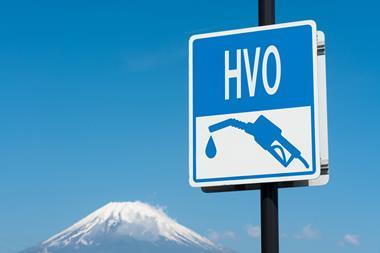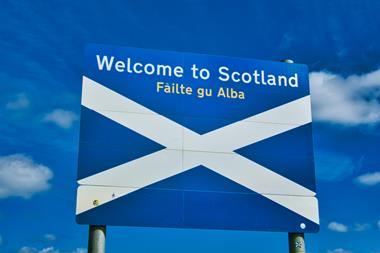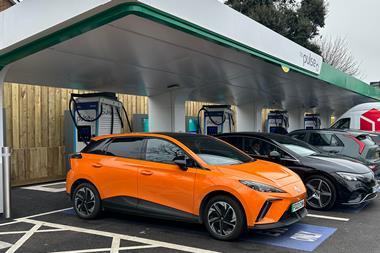If you’ve noticed your fuel sales are noticeably down on last year, you’re not alone. Retailers around the country are reporting a significant drop in volume - and those with sites in the north are seemingly the worst hit.
With fuel prices hitting £1.19 for a litre of unleaded and a whopping £1.32 for diesel - compared with last year’s prices of the mid-90s for both - it’s little wonder people are now beginning to cut back on their car journeys.
There are reports of fuel volume sales falling by almost 20% on the same period as last year, and many fear that the ongoing credit crunch means worse is to come.
Independent retailer Usman Patel, director of Mabco Petroleum, has seen fuel sales slowly falling since the price hike in February, and says volumes at his sites are now down 7-10%.
Usman, who has three Texaco forecourts in the Stockport and north Manchester area, says: "Customers aren’t using their cars as much - all three of our sites have seen this drop. I’m also on Texaco’s National Advisory Council, and everyone around the country seems to be suffering the same thing - it seems to be happening everywhere.
"It’s a general trend at the moment, you can’t blame the customers - fuel price rises mean food costs have gone up, and people are just cutting back. It feels like it’s a bleak future."
On a more positive note, Usman says that while fuel sales are down, at least volumes are no longer dropping - they seem to have levelled off for the time being. And shop sales are actually increasing.
"This makes me think that people are making fewer big shopping trips to Tesco and the supermarkets, and buying more on the convenience side," he says. "We went to Londis about two years ago and at the time shop sales shot up by about 40%. By January they had levelled off, but I’m seeing them rise again now. It’s gone up by a good 10-15%, so while we’re losing out on the fuel, we’re making more in the shop."
Paul Sykes, MD of Huddersfield-based Shaws Petroleum, has seen a more noticeable drop in fuel sales at his five BP sites.
He says: "I have never known a time when volumes have been down so much. The price of fuel is so high that people have been forced to curtail their spending in general and their motoring in particular.
"I suspect that BP sites are suffering more than any others. When fuel was relatively cheap, BP was perceived as being the quality brand of choice - but when fuel is prohibitively expensive, that perception changes to one of avarice. The past eight weeks have seen our volumes down, on average by 15% against the same weeks last year. Last week we were down 19%."
According to Ray Holloway, director of the Petrol Retailers’ Association (PRA), there seems to be a north south divide when it comes to volume. He says: "We’ve had members reporting things are a worse in the north of the country - say, north of Birmingham - than in the south. From anecdotal data, and looking at year-on-year performance, volumes in the north are down 5-12% on the same period last year, compared to 5% or less in the south."
Holloway puts this down to the extra disposable income available generally in the south, as well as less alternative methods of transport being available in the north.
Retailers are also reporting that premium fuel sales have been hit hard in the current climate. Usman, who has been in the forecourt business for about 25 years, says: "We’ve seen a downturn in premium fuel sales - people are a lot more price conscious now.
"Other retailers I’ve spoken to are also saying they’ve seen a downturn. The fact that the oil companies tell drivers they will get more mileage from premium fuel just isn’t washing any more."
Meanwhile, another side effect of the high prices is an increase in fuel theft. Police forces around the country have been reporting a steep rise in the number of people driving away from garages without paying, with organised gangs targeting forecourts - and stealing vehicle number plates to cover their tracks.
And, as reported last month in Forecourt Trader, soaring fuel costs have led to a new class of ’bilkers’ in one East Midlands city. Forecourts in Leicester have seen a growing number of people wearing hooded jackets going to the pumps and filling jerry cans with fuel before running off. Some outlets in the city were being targeted three times a week by drive-off motorists.
Jaginder Mudhar, who invented Drivestop to help retailers fight back against bilkers, says police have seen such an increase in drive-offs recently that officers have been contacting his company to find out more about his product. Drivestop, which took seven years to develop, prevents motorists from driving off without paying by spiking their tyres. It is now installed at about 25 sites around the country.
Jaginder, known as Jag, says: "The police have been saying there has been a dramatic increase in drive-offs and number plate thefts. They’re saying it’s becoming an epidemic, with people basically queuing up at certain sites to do drive-offs. It’s becoming a huge problem for them and taking up more and more of their time.
"We’re talking about sergeants, DCIs and people in prominent positions who have been contacting us. When their officers are called to a drive-off, they are letting the retailer know about Drivestop. So at the moment we’re constantly sending information out to people.
"These criminals are very intelligent at finding weaknesses in any security systems, so we’re constantly having to update things. But with fuel at these prices, fuel theft is becoming a very lucrative market.
"They steal the fuel, then sell it on at knock-down prices."
Jag adds that, with the credit crunch, retailers are watching their budgets more closely. And this, combined with rising fuel prices, means they are looking more closely at Drivestop.
He says: "A drive-off used to cost a dealer maybe £30, but now it’s averaging out at about £80. And the problem is only going to get worse."
It costs about £10,000 for an average site to get Drivestop fitted, but Jag says it’s becoming a more attractive option. He explains: "Whereas we used to say it would take an average site about two years to make the system pay for itself, it’s now more like 18 months."
According to the British Oil Security Syndicate (BOSS), the syphoning of fuel from vehicles is also on the rise. Kevin Eastwood, BOSS executive director, says: "We don’t have any statistical evidence from our members so far that drive-offs are on the increase due to fuel price hikes, but the syphoning of fuel certainly seems to be going up.
"We’ve heard stories from Kent and Durham that drive-offs are increasing, but they don’t have our Forecourt Watch scheme in place there. We’d obviously be very interested in working with the forces in those areas though."
Meanwhile, another side effect of high fuel prices is the danger to contractors working on forecourts - and the knock-on effects to retailers employing them. Martin Rackley, UK HSSE manager at BP-Global Alliance - which is responsible for the maintenance of BP’s retail sites - says: "The increase in fuel prices in recent months has sparked a significant rise in drive-offs from forecourts. The knock-on effect of this is contractors’ and customers’ lives are put at risk by drivers who are more concerned about dodging the forecourt’s CCTV cameras than paying attention to the hazards standing between them and the exit sign.
"It is imperative that any contractors working on forecourts are trained to fully secure all work areas, especially when the risk of drive-offs is so high."
Rackley recommends retailers insist that contractors have a Safety Passport from the Safety Passport Alliance (SPA). To qualify, contractors need to take a course, which is fully endorsed by all the major oil companies and the Health & Safety Executive, and explains how to protect themselves and customers from vehicles.
"By simply insisting that all contractors have valid SPA passports, clients have gone a long way towards discharging their duty of care. Awareness of traffic routes and maintaining clear access has never been so important.
"Anyone who is willing to drive off without paying certainly won’t wait for contractors and customers to clear a path. This training is just one area where a competent contractor can reduce the risk to themselves and others."
Rackley says contractor companies can get Construction Industry Training Board (CITB) grants to reimburse training costs, while SPA-approved trainers can deliver the training at local venues nationwide.

































No comments yet